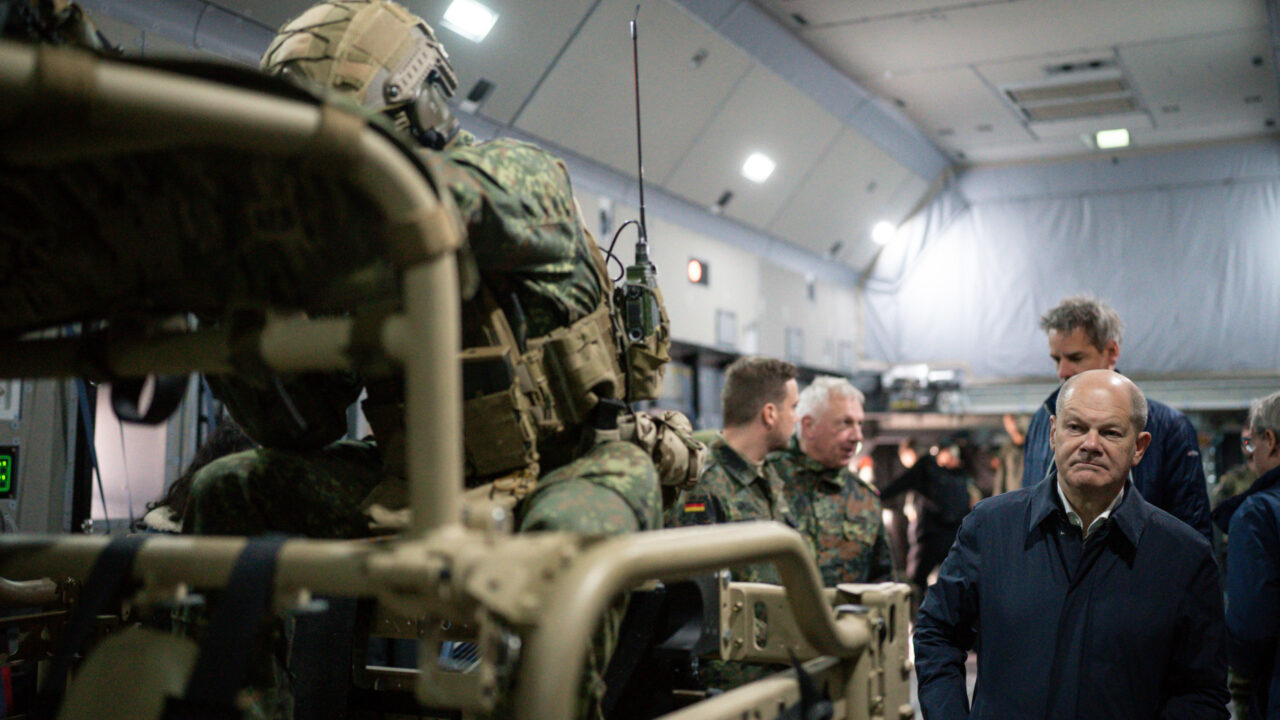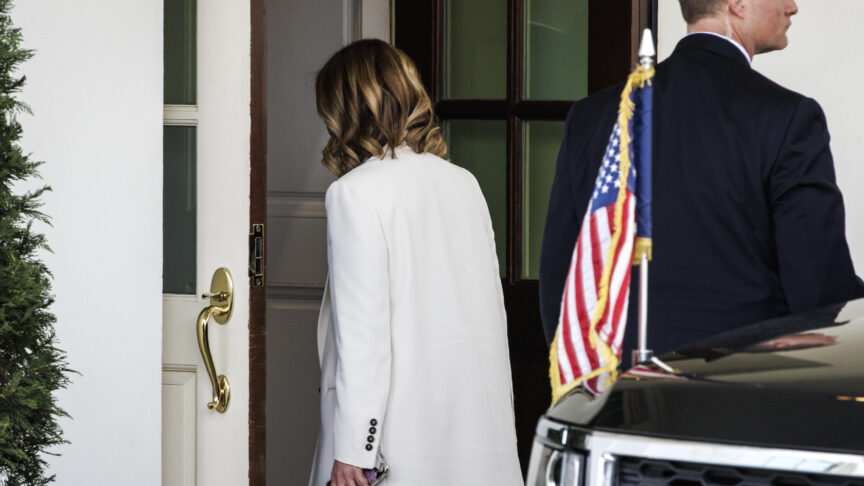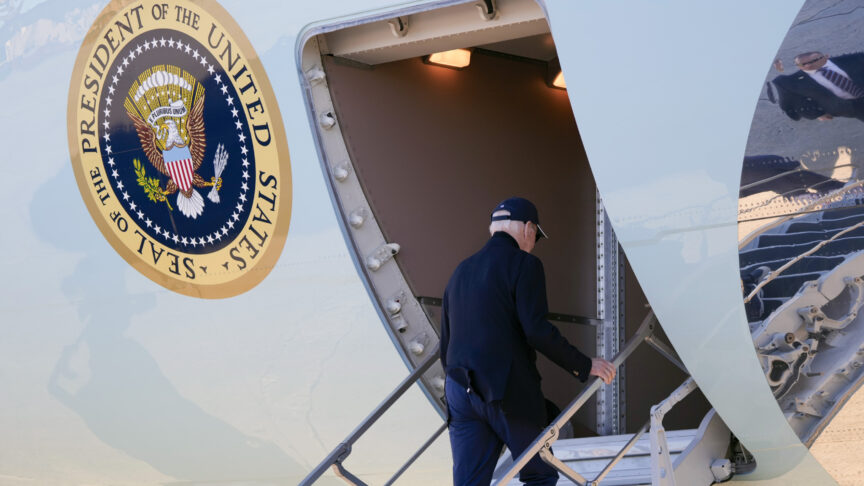Turning point or turning back: German defence policy after Zeitenwende
Germany’s defence policy has come a long way in the last two years. But looking at the challenges that lie ahead for Germany, the current course falls short – and the toughest political debates are yet to come
Depending on who you listen to, there are currently two Germanys. Both can be traced back to Scholz’s Zeitenwende, or turning point, speech in February 2022, when he spoke of overhauling Germany’s timid defence policy in response to Russian aggression and increased military spending with a special fund of €100 billion. The first Germany appears in official speeches and statements by Chancellor Olaf Scholz and members of his Social Democratic Party (SPD). This Germany is governed by a chancellor who, in lockstep with US president Joe Biden, has resolutely yet prudently spearheaded the Western response to Russia’s war on Ukraine: the German government is spending 2 per cent of its GDP on defence for the first time in three decades, and no other European country has provided more humanitarian, financial, and military aid to Ukraine. At the Munich Security Conference 2024, Scholz wished that similar decisions would be taken in all European capitals.
The second Germany is often the subject of newspaper articles or think-tank pieces, both at home and abroad. It is led by a chancellor who has not been able to fulfil the expectations placed on Germany after his Zeitenwende speech. This chancellor has often been too hesitant when it comes to arms deliveries to Ukraine, delaying decisions until there is no other option and who acts too little, too late. Under his leadership, Germany has alienated itself from its most important European partners and failed to lead a strong European defence policy. This Germany is increasingly emerging in statements not only by opposition figures but by some within the governing “traffic-light” coalition itself.
As with beauty, assessing Scholz’s Zeitenwende is apparently relative. To understand the true extent of Germany’s policy shifts, one must go back to its starting point. If someone had predicted in December 2021 that a member of the traffic-light coalition would call for the armed forces to be “fit for war” some two years later, it would likely have been met with disbelief. At that time, current defence minister Boris Pistorius was still Lower Saxony’s Minister of the Interior and Sports, Nord Stream 2 was a pipeline waiting to be opened, and a fundamental overhaul of Germany’s security and defence policy was the last thing the coalition had in mind.
When Scholz made his speech, shortly after the shock invasion of Ukraine, Zeitenwende was not a well thought-out foreign policy concept but a catch-up process to make up for past failures: the decades-long neglect of the German armed forces; the disastrous miscalculation of the nature of Putin’s regime; and the carelessness with which German politicians let the country’s energy supply be dependent on Russia. Only in the following months did it slowly become a government programme. Against this starting point, the government has come a long way.
The €100 billion special fund for the German armed forces at least laid the groundwork for making up for the chronic underfinancing of the past 30 years that has left the armed forces plagued by a shortage of personnel, material, and infrastructure. Germany had stepped up its military support for Kyiv from the initial 5,000 helmets to being Ukraine’s second-largest donor. And since the beginning of 2023, Germany has been independent of Russian energy supplies. At least on paper, its mentality has changed too: Germany’s first ever national security strategy identifies Russia as the greatest threat to peace and security in Europe and the government’s new China strategy contains a surprisingly clear description of the systemic rivalry with Beijing.
But the past two years have also shown how difficult it is for actors to think about policies that require going against their own political socialisation. At times, German foreign policy has resembled a dancing procession, in which the participants jump three steps forward and two steps back to the beat of a polka. While the Greens and the Free Democratic Party (FDP) in government have often adopted a more critical and confrontational stance on Russia and China, the SPD and the chancellery have been more reluctant from the start. This became particularly evident in the endless debates over the delivery of certain weapons systems to Ukraine or over allowing Chinese investment deals in Germany.
Looking at the challenges that lie ahead for Germany, the course set out over the past two years falls short. In the future, the government in Berlin will have to become a guarantor of security in Europe more than at any time since the end of the cold war – especially because Europeans can no longer rely on a future US administration to see European security as a core American interest. Germany will also need to develop a new economic model that generates prosperity in a world of increasing fragmentation and great power rivalry where dependency can be weaponised.
The real tough political debates are yet to come. Over the past two years, the German government has wrongly assumed that it can quietly implement the policy changes associated with the Zeitenwende without imposing hardship on Germans. It has repeatedly affirmed that it will not cut back on its other transformation projects (especially green energy and digitalisation) and will not put additional burdens on citizens. The idea was to try to solve the problems by throwing money at them – as the Merkel government did when Germany’s economic outlook was still rosy. Even when the Federal Constitutional Court’s budget ruling put an abrupt end to this practice, the chancellor assured citizens in the Bundestag: “In your everyday life, here and now, the decision of the Federal Constitutional Court changes nothing.”
Over the past two years, the German government has wrongly assumed that it can quietly implement the policy changes associated with the Zeitenwende without imposing hardship on Germans
This will not be sustainable. The federal budget for 2025 faces a funding gap of billions of euros. A particular challenge will be to make higher defence spending sustainable and meet NATO’s 2 per cent target even after the special fund expires (probably at the end of 2027). The German chancellor reaffirmed this intention last year. According to the medium-term financial plan, however, the regular budget for defence is frozen at around €50 billion until 2026, leaving an annual gap of at least €25-30 billion to reach this 2 per cent goal. The governing coalition does not agree on how to close this gap – whether by drastic cuts in social welfare, by raising taxes, or by easing the debt brake. But without a sustainable and resilient financial plan, Germany’s defence policy will not be able to transform.
At the same time, the mobilising effect of Russia’s war seems to have dissipated among the general population as well as some in the Bundestag. Ukraine no longer dominates the daily headlines and issues such as the sharp rise in energy prices and migration have taken its place. While the soldiers of the German armed forces are aware that training scenarios can quickly turn into bitter reality, the rest of the country is yet to grasp this inconvenient truth.
At this year’s Munich Security Conference, Scholz rightly said “without security, all else is nothing”. Translating this phrase into concrete policy and budget priorities, without losing citizens’ support in the process, will be the biggest challenge facing Germany since the Russian invasion. The Germans can be proud of how much they have achieved compared to where they were two years ago. But given the challenges, it is not enough to be better than yesterday. They must be in a position to face tomorrow.
The European Council on Foreign Relations does not take collective positions. ECFR publications only represent the views of their individual authors.



